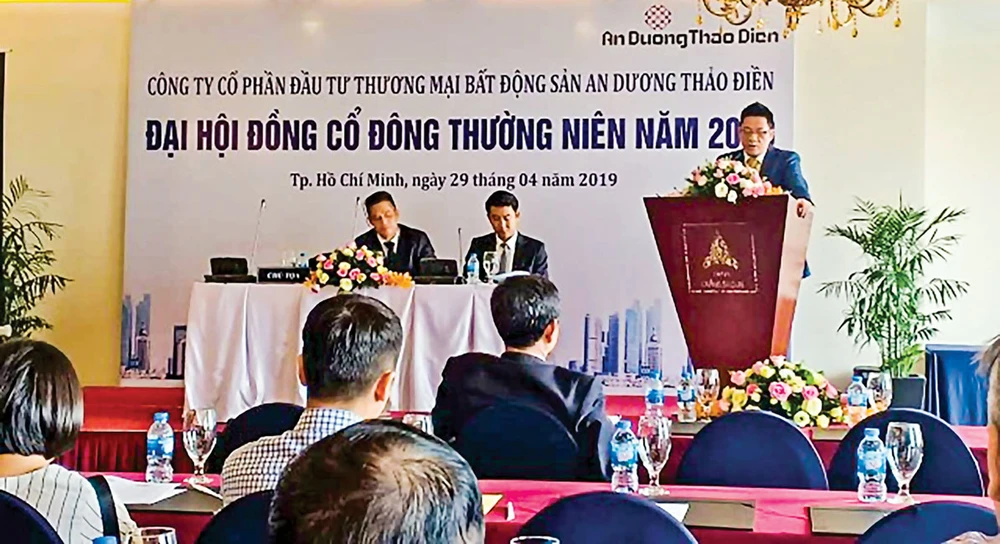
Over time, however, doubts have arisen and pulled HAR down to VND 2,000 per share, and given the current business volatility, it seems impossible that the stock will ever rise back to face value again.
Doubts of stock price manipulation
HAR was officially listed on HOSE in the trading session on 17 January 2013, at a listing price of VND 12,000 per share. This stock traded sideways in the first few weeks, then suddenly pulled up dramatically on the trading session on 20 March to touch VND 32,600 per share, an increase of 250% in just two months of trading. After reaching this peak, HAR again moved sideways for several sessions, then unexpectedly exceeded the threshold of VND 40,000 per share in the trading session on 22 April. However, after surpassing this peak, HAR was pulled down sharply to just VND 20,000 per share in the session on 4 June 2013.
In another surprise move, HAR stock suddenly shot up to VND 35,500 per share in the session on 21 June, much to the amazement of investors. Like previous waves, after reaching the expected threshold, this code again pulled down sharply and fell to VND 20,000 per share. Although the cause of the waves is unclear, but with this increase and decrease cycle in HAR stock, many investors began to pay attention to when this stock would reach bottom, or wait for the next wave. Typically, there were two trading sessions on 10 June and 12 June, with around 2.2 million shares transferred, double that from previous sessions. The fact that HAR continually created waves and anchored at a high price compared to the intrinsic value of the business, while there was no outstanding information before and after each increase or decrease, made many people doubt HAR stock.
Shareholders disillusioned
The real reason investors questioned HAR uptrend in 2013 is because the business situation of this enterprise was nothing outstanding, but rather weak compared to other enterprises in the same field. According to the 2012 audited financial statements, the net profit from operations was only at VND 1.2 bn, a sharp decrease of 77% compared to the same period in 2011. However, from profits of more than VND 11 bn from liquidation of land use rights, HAR achieved about 50% of its annual target.
Although profitability fell sharply in 2012 due to decline in efficiency of the main business, the cost of corporate management accounted for a large portion and profits were mainly offset by transfer of liquidation of land use rights. Right at the time of listing, HAR profits for the first quarter of 2013 came mainly from liquidation of land use rights, as this contributed around VND 2.1 bn to revenue, compared to net profit of only VND 231 mn.
Therefore, HAR had total revenue of around VND 215 bn in 2013, a 6.5 times increase compared to 2012, of which main operating revenue was VND 135 bn and VND 80 bn came from mining activities. The expected profit before tax from these two segments was VND 33.3 bn and VND 25 bn, respectively. Despite nurturing ambitious plans, when answering questions of shareholders at the 2013 annual shareholders meeting, the Board of Directors of HAR declined to outline any strategic business plan of their mining activity, and only promised to notify shareholders in the near future.
Such ambiguity on the part of the Board of Directors of HAR was also a reason that many investors felt disillusioned and pushed for selling, causing HAR to plunge further. On 28 August, for the first time HAR fell below face value of VND 10,000 per share. From 2013 up to now, HAR has only traded at a very low price, sometimes even near VND 2,000 per share. HAR stock plunge not only caused small shareholders heavy losses, but even large organizations like VinaCapital suffered substantial losses.
No focus on business strategy
HAR was established as a JSC in 2007, with charter capital of VND 32 bn. The initial goal was to become a professional real estate development enterprise, a leader in the field of real estate services, leasing and management. With this ambition in mind, HAR attempted to increase capital to acquire land. In 2010, HAR increased its charter capital to VND 100 bn and then to a further VND 350 bn in 2012. After listing on the stock market, HAR continued to issue a large number of shares to increase charter capital. At present, HAR has charter capital amounting to VND 1,013 bn.
Despite this large charter capital amount, HAR has a business strategy that worries shareholders, especially its move to enter into new business arenas. For example, the decision to retain all profits in 2017 to focus resources to revive the Co Ba Soap brand. HAR spent more than VND 214 bn acquiring nearly 31% of the capital of Orient Manufacture and Trading Joint Stock Company, the enterprise that manages this soap brand. However, up to now, the return date of the Co Ba Soap brand is still unclear. It is worth mentioning that HAR's outward investment activities have also disappointed shareholders. For example, in 2016, HAR invested in G Homes JSC and Glenwood Horeca JSC to the tune of about VND 90 bn. However, both businesses are running quite inefficiently.
Learning from past mistakes, HAR shareholders will now probably not have high expectations or believe in the ambitions of its business leaders. In fact, HAR's corporate governance has many fundamental errors. In October 2019, HOSE sent a letter to HAR reminding the company to comply with regulations of corporate governance. Previously also, HAR had been forced to pay around VND 2 bn to the Tax Department in District 1 in Ho Chi Minh City for defaulting on tax payment by more than 90 days.




















